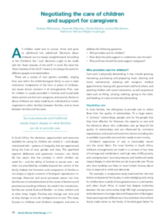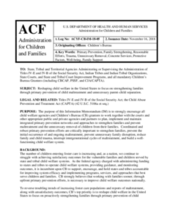Displaying 331 - 340 of 947
This chapter from the South African Child Gauge 2018 focuses on childcare and children’s caregivers in South Africa and aims to address the following questions: Who provides care for children? How does the state support or undermine care choices? Why and how should the state support caregivers?
This comprehensive narrative review identifies the use of motivational interviewing (MI) in child welfare (CW), the outcomes of MI use and the gaps in the literature.
The purpose of this Information Memorandum (IM) is to strongly encourage all US child welfare agencies and Children’s Bureau (CB) grantees to work together with the courts and other appropriate public and private agencies and partners to plan, implement and maintain integrated primary prevention networks and approaches to strengthen families and prevent maltreatment and the unnecessary removal of children from their families.
To better understand how and for whom parenting intervention may improve family outcomes in child welfare services, the authors examined whether parents’ own history of child abuse moderated the indirect effects of the Promoting First Relationships® (PFR) intervention on toddlers’ secure base behavior via parental sensitivity.
This chapter provides updated information about the use of parent–child interaction therapy (PCIT) with young children who have experienced maltreatment.
The chapter describes the rationale, research support, and techniques that support the application of parent–child interaction therapy (PCIT) to American Indian families.
This report introduces key principles that guide initiatives to promote positive parenting.
This guidance report reviews the experience of and lessons learned from service provision in social welfare, child protection and childcare, health care, education and law enforcement. It presents methods, tools and service models that have proven effective in preventing and responding to corporal punishment.
This guidance report looks at the different types of campaigns and actions that can be used to generate more aware and supportive societies, ultimately helping to bring about a shift away from corporal punishment towards non-violent parenting.
This report outlines approaches to achieving equal protection from assault for children in the home.


